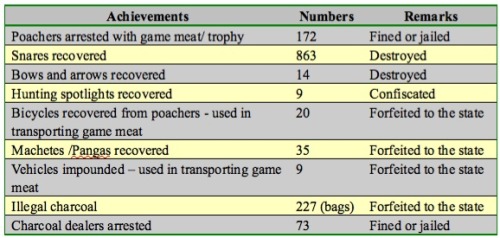Wildlife rangers are on the frontlines of wildlife conservation. In many places, they are also the most under-funded and under-supported conservationists, though often the most passionate because they come from the communities they are trying to protect.
One of the most successful conservation programs in the world is the Maasai game scouts program in southern Kenya. Developed through African Conservation Centre and Dr. David Western, these programs recruit young Maasai men who in the past would have been fully 'employed' as moran, or warriors, for their communities. Their jobs would have been to protect livestock and homes from raiders (and maybe do a little raiding themselves). Today, they are largely unemployed and lack opportunities close to home. There are only so many jobs in eco-lodges.
 Amboseli-Tsavo Game Scouts
Amboseli-Tsavo Game Scouts
With the development of Maasai parks such as Amboseli and now fully community-owned conservation areas such as Shompole, Olkiramatian, and Mt. Suswa, there came a great need for rangers to patrol for poaching, woodcutting, charcoal burning, and to help protect tourists during safaris.
A pilot program in six communities in the Amboseli-Tsavo region employs nearly 40 scouts and is governed by the Amboseli-Tsavo Game Scouts Association. The association’s initial assets include three motorbikes, a Land Cruiser, 36 bicycles, a computer, and a radio system. Their successes over the last five years are significant enough to prove the concept (see chart, below) and justify expansion of the community scout program across the entire South Rift region.

The South Rift Game Scouts Association is just getting started, and have need for basic equipment just to operate. They patrol a vast area encompassing the communities of Shompole, Olkiramatian, and Mt. Suswa, all of which established conservation areas and have new tourist enterprises. In Olkiramatian, the community has also founded a Resource Centre, and the Game Scouts also are providing important information as Resource Assessors.
In Mexico, there are striking parallels. The Northern Jaguar Project purchased two large ranches in the northern Sierra Madre in the state of Sonora. Cowboys formerly employed by the ranches were out of work, and interest in conserving jaguars—which they previously had killed, since they kill stock—was low if non-existent.
But the NJP team established a Jaguar Guardian program to hire back the vaqueros, or cowboys, and train them to record data using GPS and remote cameras, and to patrol for illegal hunting.
And on a nearby private ranch, El Aribabi Conservation Ranch, the Robles family is struggling to protect 10,000 acres of prime jaguar and ocelot habitat. Their small family and staff are also "jaguar guardians."
Despite the successes of these programs in East Africa and Mexico, they struggle for basic supplies such as uniforms, radios, GPSs, and tents. They also need vehicles, and training.
___________________________________________________________________________
Resources for Rangers is our campaign to help provide these much-needed supplies and trainings.
How can you help?
Please see our Give page
